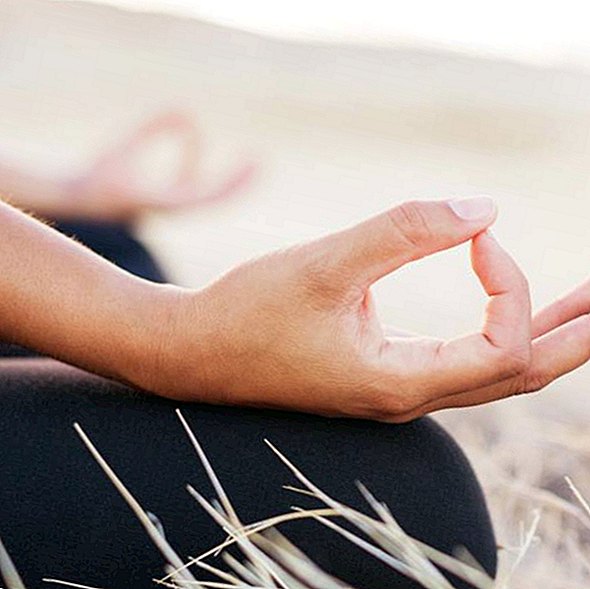Self-healing through meditation

Everyone wants to get behind their secret. Millions of research funds have been invested in recent years - in countless long-term studies, laboratory tests, ECGs and EEGs. Curious scientists quickly shoved venerable Buddhists into the computer tomograph and recorded their brainwaves to capture the positive impact on Western infidels. With impressive result: In contrast to known relaxation techniques such as progressive muscle relaxation and autogenic training, meditation is not only relaxing and soothing, but goes much deeper and has a more lasting effect.
More than just relaxed The measurements showed that the brain activity changes significantly in the state of meditation. Those who immerse themselves in their innermost, get into a kind of intermediate world - in the state between waking and sleeping. It is important to know that depending on the state of consciousness, different electrical frequencies can be measured in our brain. During the day, when we work, solve problems, just wake up, the beta state prevails. Through meditation, it is possible to postpone this awake state - although one does not sleep, one enters the more relaxed alpha state in which the vibrations of the brain waves slow down. The effect: a phase of highest concentration and a feeling of strong energy. In this situation, the brain produces calming messengers that counteract stress. Those who have accumulated years of meditation experience may even achieve the premier class and reach the so-called theta state: an even lower oscillation frequency, which also occurs in dream sleep and in a trance. Creativity and visual imagination are strongly activated, and psychedelic drugs such as LSD cause this condition. However, such experiences are reserved for true meditation masters.
First successes after a few weeksNormal mortals have to forego this state of intoxication for the first time, but can already enjoy the first positive effects after just a few weeks of meditation training: Blood pressure and pulse rate decrease significantly, breathing slows down and deepens, oxygenation improves throughout the body.
Aggression disappears too, as soon as the irascible often buzz "Omm ...". Already 300 clinics are working in the states with the program of the so-called "Mindfulness Based Stress Reduction" - so reduce the stress by mindfulness. The inventor Jon Kabat-Zinn, behavioral physician and meditation teacher, is convinced that the search for an inner calmness activates the self-healing powers. And statistics prove him right: Over the past two decades, more than 12,000 people have successfully participated in his project. Incidentally, a method of restoring freedom on probation in St. Louis, USA: Prisoners must take part in a meditation course.
Since 1999, the meditation mats have been regularly rolled out in the clinic Essen-Mitte, department "Naturopathy and Integrative Medicine" as part of a model experiment. Patients explore their body with a similar procedure called "body scan". This method focuses attention on different parts of the body and senses the sensations without evaluating them.
So, whether stress or pain, just say "Omm ..."? That it is not so easy, you guessed already. And even if you were more prickly than relaxed at the first meditation attempt: That's normal. Above all, you should not stop trying it again. This time with the technology that really suits you.
That's proven
- Meditators develop cancer only half as often as non-meditators.
- After only four weeks of meditation practice, subjects score 40 percent better on exam questions and concentration tasks than meditation muffle.
- Flu vaccines have a better effect on meditators. The subjects developed significantly more flu antibodies.
- Meditators are 73% less likely to have respiratory problems.
- They suffer from 87 percent less mental illnesses such as anxiety disorders or depression.
- Meditation also helps against: chronic pain, asthma, psoriasis, allergies, arteriosclerosis.
The roots
For millennia people have been seeking rest in themselves"Medias", Latin for "the middle", and "meditatio", for "being in thought" - the original meaning of the word already reveals what meditation is all about: to achieve a state of consciousness that restores the inner balance. Buddhists and Hindus practice spiritual contemplation since the 3rd millennium BC as a sign of religious devotion. But secular life and the western world conquered meditation only in the 20th century. In the seventies, mainly hippies and dropouts rushed to the Asia trend.Since the beginning of the eighties, the method has increasingly been researched scientifically.
Itinerary into the ego
Hustle and bustle, appointments, noise - and in the meantime immerse yourself in the depths of your own consciousness in a relaxed way: It's not possible to press a button. Especially not at the beginning. So four things to think about.
The best placeYou should turn off sources of interference from the beginning. To meditate, find a space that you can finish, possibly darken. A room in which you like to be and which has a pleasant temperature.
The best attitudeTheoretically, you can meditate in any posture - but it is most comfortable sitting down, be it on a soft pillow or a comfortable chair. Lying down there is a risk of falling asleep (even relaxing - but that's not the condition you want to achieve). Keep your spine straight and your breath will flow best evenly.
The best timeIf you like it authentically, the so-called nectar hour between two and six o'clock in the morning is recommended - the old masters of meditation choose this time, because then the subconscious mind is still completely open and we find quick access to the inside. However, late risers do not have to be stressed: they can just as well exercise at any time of the day.
BALLOON? MEDIA BY APP
Speaking of mindfulness: Do you want to learn to meditate? That's easy via app! Balloon shows you step by step. Here you can start directly with a free meditation course










